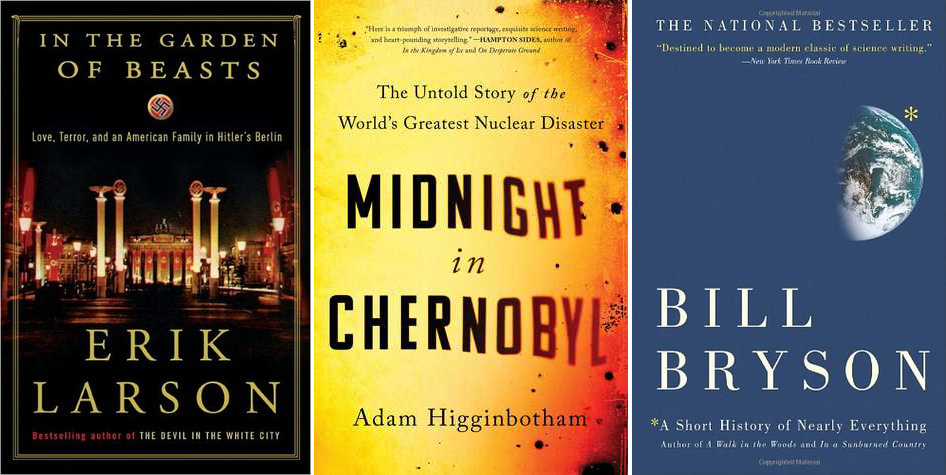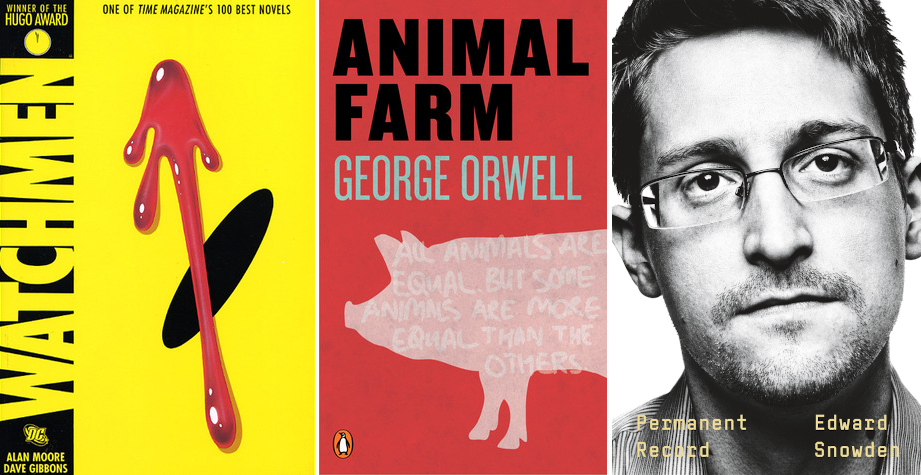Previous book lists: 2019, 2018. My Reading List has a full log of the books I read.
This year I read about the same number of books as I did last year, but I remember the contents of them less (to be fair, there was a lot going on). I think I used reading more as an escapist tool than a means of entertainment or enrichment this year, so I have fewer titles that I’d recommend as “you need to read this”. However, I still had a few favorites worth sharing:
Fiction

- Anathem (Neal Stephenson)
Anathem was the best piece of fiction I read this year. I already wrote about it a bit in a previous post:
Anathem is truly great scifi, in that you can’t really write much about it without spoiling its effect.
I went in completely cold, and I’d recommend reading as little about this book as possible if you decide to jump in. Just the plot teaser on Goodreads gives too much away, in my opinion. It’s one of those novels where half of the fun is figuring out what’s going on. Yes, you have to wade through a few hours of seemingly pointless exposition, but it pays off in spades. Without spoiling anything, Stephenson adds a few paradigm shifting plot points throughout the book that are truly delightful. It feels like watching a puzzle unravel in realtime.
The world-building that Stephenson does in Anathem is some of the best I’ve ever read. He developes a vocabulary over the duration of the book that is quite effective in conveying the type and history of the world in the story (can’t say more without spoilers). Somehow, this doesn’t feel tedious, which is quite the accomplishment.
I’d also note that Anathem is a very long book, but similar to Stephenson’s Seveneves, it does a lot to earn this length. The plot has a richness that I really appreciated; I’d have been content to read an entire book spanning each of the various subplots. Can’t recommend Anathem highly enough.
- Kafka on the Shore (Haruki Murakami)
Kafka on the Shore is the first fiction book by Murakami that I’ve read. To be blunt, this is a really weird novel. But it’s weird in a very satisfying way. Murakami puts just enough magical realism in Kafka on the Shore to make it curiosity-provoking, without crossing the line into eye-rolling territory.
I can see why this is a polarizing book. It’s tender in a way that either rings true, or comes off as maddeningly cheesy:
A rest area on a highway is just a place you pass through. To get from here to there.
There are many things we only see clearly in retrospect.
If you come into this book wanting to dislike it, there’s plenty of things to latch onto. There a couple plot points that made me almost want to write the whole book off, and there’s one part at the end of the book where I got annoyed by the “Hey this is a symbol! Don’t you get it, this library is a metaphor for human memory!” that I had to suppress a cringe or two.
But when Murakami’s writing works, and when you give his writing a good faith read, it’s really fantastic. He’s an expert at conveying atmosphere. This paragraph evokes such a sense of placeness:
The walls are thin, the floors creak, and probably the only natural light the place gets during the day is when the blinding sunset shines in. I hear a toilet flush in some other unit, the scrape of a cabinet being shut somewhere. Seedy, all right, but at least it has the feel of real people living real lives. Dishes piled up in the kitchen sink, empty plastic bottles, half-read magazines, past-their-prime potted tulips, a shopping list taped to the fridge, stockings hanging over the back of a chair, newspaper on the table opened to the TV schedule, an ashtray, a thin box of Virginia Slims.
Kafka on the Shore is worth reading just for moments like these; Murakami is a writing craftsman.
- Caliban’s War & Abaddon’s Gate (James S.A. Corey)
Caliban’s War and Abaddon’s Gate are the second and third books in James S.A. Corey’s The Expanse series (which begins with Leviathan Awakes). I don’t usually read sci-fi series, but I enjoyed Leviathan Awakes so much that I decided to continue reading The Expanse. Neither of these books by themselves are transcendent, but I enjoyed each of them enough that I plan to continue reading through the series (albeit slowly). They’re mostly fun action/sci-fi type plots, but there’s enough substance in the development of the main characters, introduction of secondary characters, and set pieces to keep you interested.
Non-Fiction

- In the Garden of Beasts (Erik Larson)
In the Garden of Beasts is a historic account of the (rather hapless) American ambassador to Germeny’s experience living in Berlin during the rise of Hitler and the Nazi party. It’s a “fish out of water” story mixed with interwar politics: an American history professor – who, by the way, really just wants to complete his life’s work, a tome on the culture of the American South – somehow gets sent to Berlin to “promote the interests of America abroad”. No one takes him seriously (not by the US State department, not by the German government, and not even by his own staff in the Berlin embassy).
Along the way, there’s a horrific amount of antisemitism (on both the part of the Germans and the Americans), accounts of the banality of evil, and people really just not getting it and making hilariously myopic statements in the midst of Germany’s collapse into fascism. Also, the ambassador’s daughter, a budding socialite, rubs shoulders with prominent Nazi officials, creates a diplomatic incident by dating a member of the Soviet embassy, and generally remained pro-Hitler well past the point where state sanctioned violence was impossible to ignore. Not a great look, with the benefit of hindsight.
The book ends before WWII starts, but gives some terrifying accounts of the violence of the interwar period. Some of this feels straight out of Kafka:
And then there was poor Willi Schmid—Wilhelm Eduard Schmid, respected music critic for a Munich newspaper—who was playing his cello at home with his wife and three children nearby when the SS came to the door, hauled him away, and shot him. The SS had erred. Their intended target was a different Schmid. Or rather, a Schmitt. Hitler dispatched Rudolf Hess to make a personal apology to the dead critic’s wife.
A sobering read, especially given the threats to democracy that we witnessed in 2020.
- Midnight in Chernobyl (Adam Higginbotham)
If you didn’t get enough Chernobyl history from the HBO Miniseries released this year, then Midnight in Chernobyl provides plenty more.
I don’t think I really have to sell this book, but: if you’re interested in nuclear reactors (or any complex system, really), the reactions of individuals and organizations to intense periods of crisis, or Soviet-era politicking, you’ll probably find something in this book to enjoy.
- A Short History of Nearly Everything (Bill Bryson)
As a much more uplifting pick, A Short History of Nearly Everything is a great piece of scientific explanatory writing about the natural world. I’ve read several of these “let’s TL;DR all of science” books in the last few years, and this was the first that didn’t feel like a waste of time.
I think this book “works” because it doesn’t attempt to be a stuffy arbiter of knowledge; rather, it walks through the progression of various fields with a sense of curiosity, instead of just parroting the current best understanding. Bryson presents theories that were later proven incorrect as not wrongheaded, but rather as a progression of the scientific method that (slowly) leads to a richer understanding of the universe. For some reason, when Bryson “zooms out” to put the human experience in the context of all we know about the natural world, it comes off as authentic in a way that I don’t often feel:
If this book has a lesson, it is that we are awfully lucky to be here-and by ‘we’ I mean every living thing. To attain any kind of life in this universe of ours appears to be quite an achievement. As humans we are doubly lucky, of course: We enjoy not only the privilege of existence but also the singular ability to appreciate it and even, in a multitude of ways, to make it better. It is a talent we have only barely begun to grasp.
This ended up being a pretty light read, and might be a bit too “pop sci” for some folks. However, I found it’s tone to be enjoyably whimsical, and its message comfortingly optimistic.
Honorable Mentions

- Watchmen (Alan Moore)
I wrote about a little more about this in a previous post. I think this might have been the first graphic novel / comic book that I’ve read (ever?). It’s not my favorite medium, but I found Watchmen to be quite entertaining. It’s very effective at communicating the Cold War era zeitgeist.
- Animal Farm (George Orwell)
I’m surprised I made it through school and college without having read Animal Farm; its on most English classes’ reading lists, but due to luck of the draw, I never had to read it. It’s a great political metaphor, and I enjoyed reading it “now” as something that I chose to read rather than being forced to read it in high school. There’s a lot of subtle historical allusions that I doubt I would have appreciated when I was younger.
I don’t have much else to say other than Animal Farm still holds up in 2020.
- Permanent Record (Edward Snowden)
Permanent Record is Edward Snowden’s memoir; it covers his early life through his work at the NSA, and his eventual choice to become a whistleblower. I thought I knew most of Snowden’s story, since I was following the news while his story unfolded, and Snowden is still a prominent figure in the digital privacy sphere. However, this memoir adds a lot of additional context – Snowden’s upbringing as the child of career civil servants, career at the CIA, and a worrying description of the corrupt system of NSA subcontracting – that I didn’t get from following the news of the Snowden leaks.
Clearly, the book is from Snowden’s perspective, so I don’t think I’d consider it a comprehensive source on the subject, but it was worth reading even if you generally agree with Snowden’s arguments and have a familiarity with his whistleblowing. The practices that Snowden exposed in his whistleblowing were alarming, but in some ways the lengthier description this book presents of how modern government surveillance operates at an organizational level is more concerning.
Book covers from GoodReads. Cover art: A trompe l’oeil of a collector’s study with engravings, drawings, letters and books (1707).